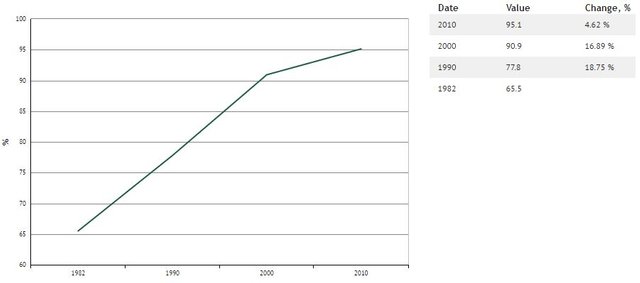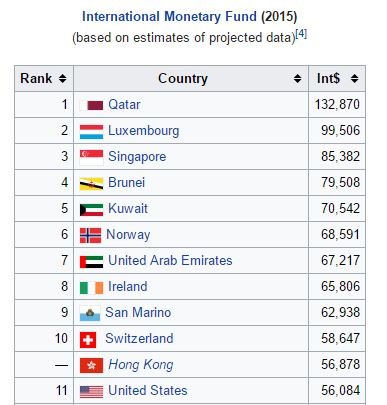Does more education mean higher productivity and growth?
Education, Education and More Education

In my last post, I discussed the trials and tribulations of my younger self going through China's education system, highlighting the emphasis that China (and several other countries) places on education. A commenter noted that :
"If China has a crisis, many young Chinese today do not have the endurance nor the developed expertise to compete effectively in a global environment where cheap labour is no longer a comparative advantage."
And that is a fair comment because it is true that whilst pre-university education in China ranks amongst the best in the world as evidenced by their top ranking performance in internationally standardised tests such as the Trends in International Mathematics and Science Study (TIMSS) and Program for International Student Assessment (PISA), higher-education still falls short of western standards where knowledge based capital is suppose to matter more for driving economic growth and not raw human capital.
I disagree and here's why.
More education ≠ More productivity
We often associate a productive economy as one with higher stock of educated people which simply isn't true. For instance, we could correlate China's miracle growth since their economic reforms of the 1970's with an increase in literacy rate from under 65% in the 70's to over 95% today. But that would suggest that the amount of productivity-related knowledge an average worker needs to possess for their job(s) has increased. If anything, it has fallen, and more evidently in more developed countries where a greater proportion of the workforce are now employed in low-skilled service jobs that do not require much education.

China's adult literacy rate (15+)
Moreover, as economies improve, a higher proportion of knowledge is embodied in machines. Thus, increases in economic productivity may even lead to workers requiring less understanding of what they're doing than their counterparts in the past. A prime example would be check-out assistants who do not even need to know basic arithmetic, a skill which their predecessors would definitely have needed.
The effect of rising mechanisation of industries as a fast track way to increase productivity has some side effects however. Workers are easier to substitute and more technologically advanced economies may in fact need fewer educated people.
Not all education is meant to raise productivity

Many subject areas have little to no direct relationship to increased economic productivity. For example, Classics, History, Philosophy and Music. From a fundamental economic view, these subjects and many others would have little impact on economic productivity and would be considered a waste of time. They are taught because we believe they enable people to lead more enriching and fulfilling lives, not for their contribution to productivity growth.
The Fallacy of Higher-Education
Given the points discussed above, we could argue that whilst the average worker needn't be more educated, for economic development and productivity growth, we would require more educated people coming from higher-education right?
Wrong (Kind of)
The best example would be Switzerland. A highly productive, and highly industrialised country that ranks in the top 10 of richest countries by GDP per capita ($58,647). Switzerland has by far the lowest university enrolment of any country in the developed world. According to UNESCO, the rate of university enrolment in Switzerland is 57% in 2014, compared to 84% in US. Historically, this figure was even lower in the 1990's going as low as 16% which was less than half the average of the OECD average of 34%.

IMF figures for GDP (PPP) Per Capita in terms of Int$
The question naturally becomes how Switzerland is able to remain at the top of the international productivity league despite providing much less higher education?
We could argue that the quality of education at these universities may differ country to country. For instance, if New Zealand universities are not as good as Swiss universities qualitatively speaking, then it might explain why Switzerland is richer than New Zealand (In terms of GDP PPP Per Capita) despite a lower proportion of the Swiss having university education compared to New Zealand. But what if we made the comparison with the US? Surely we can't argue that the Swiss universities are so much better such that they can get away with significantly lower enrolment rates than the US?
What this suggests is again, the low productivity content delivered at higher-education. Rather, the non-productive components delivered at higher-education are less about the subjects which deliver enriching lives and personal fulfilment (which is more the case for secondary and primary schools) and more about what economists call the sorting function.

Of course, we cannot deny that Higher-Education imparts important productivity related knowledge to it's students, but another perhaps more important role of Universities is establishing an individuals ranking in terms of employability.
In most lines of work, intelligence, organisation and the capacity to learn matters more than the specialist knowledge you learnt at university. In most cases, these specialised skills and knowledge areas will be obtained through working the job. Thus by graduating from university, you are demonstrating that you are likely more intelligent, more organised and have a higher capacity to learn than those who have not. And these are the general qualities that employers look for, not the specialist knowledge you might possess but may be irrelevant to your job.
You stand, I stand, we all stand
The problem is, the emphasis on higher-education has lead to countries expanding their higher-education systems to allow for more people to get a degree. (Often in the belief that more graduates = better productivity!) And once the proportion of people going to university crosses a certain threshold, it becomes a necessity to go to university just to get a decent job.

For example, if 50% of people go to university, then by not going to university, you would be implying that you are in the bottom half of the ability distribution. If you want a good job, then you feel obligated to go to university despite fully knowing that you will waste your time studying things you won't need for work. More demand for university places leads to more supply, and this in turn increases the enrolment rate further, making the pressure to go to university even higher. This eventually leads to degree inflation and the pursuit of even higher education such as masters and PhD's just to stand out from the crowd. Where before you believed getting a degree was a waste of time but a necessary formality to get a decent job, now even more time has to be wasted on getting masters and PhD's, even when the productivity content of these further degrees remain minimal for your future job.
With Switzerland, they were able to rank as one of the highest productivity nations in the world in the 1990's with just a higher-education enrolment of around 16%. Today, their enrolment figures are nearer 50% which still means that they are ranking ahead of the US in terms of GDP (PPP) Per Capita despite having 40% less University enrolment. What this means is that 40% or more of the people in countries with comparable enrolment ratios to the US are wasting their time in the zero-sum game of sorting.

Higher Education is now like a theatre where people stand up to get a better view, triggering people behind them to stand. Once enough people stand, everybody has to stand and nobody gets a better view, but everybody feels less comfortable.
Education and Productivity : Take 2
After all of this, you might think that i'm against education, specifically higher education. I'm not. I'm a graduate, and I'm also guilty of studying double master degrees for the reasons I mentioned above. I believe that education is extremely valuable, but not for the purposes of raising productivity of an economy. I believe education develops potentials in individuals, and allows them to live more enriching and fulfilling lives.
What is evident however, is the productivity and economic prosperity of a nation is largely determined by how that nation organises individuals into enterprises with high productivity. Paying specific attention to supporting organisations for productivity growth. Not on mindlessly producing more graduates in the hopes of significant upticks in productivity.
China has a low university enrolment ratio of only 23%, and yet the positive rate of change of productivity and economic growth is indisputable. They may not have the highest quality University education system, but they do make up for it by organising their citizens into collective entities with high productivity.
That's an interesting piece of text which I agree with.
One should not start university studies just for starting them or because others do. First one is loosing his or her time, and next we are making others loosing their time as well (slowing down the pace, getting the attention elsewhere, etc.). And at the end, one may get a degree which will be useless and work in a different domain where this degree is useless.
On the other hand, managing to get a PhD will bring a plus to the society, but do we really need many many people with a PhD? Again, I think that the answer is no. What we need is people ready to take care of all jobs the society needs.
Thanks for the reply, I was beginning to think no one would comment!
I think it comes down to the utility of such degrees, and even PhD's. If it's for the sake of just standing out from the crowd, then I think the studies are wasted. You're right, we do need people to take care of all jobs the society needs. But society might not be ready to accept this fact. The fact that we have entire nations opting for management service type jobs means that there is skill displacements across borders. After all, a country cannot operate with only managers. And this is also part of the reason why there is so much blame on foreign workers coming to developed countries and "taking" the jobs away from the native workers.
This time I was about to comment early as we are roughly in the same timezone ^^.
PhD are very useful. They form people to think about a very hard problem and solve it within a couple of years. This leads to people very useful to the society, even if they will eventually work in a different domain. They have the experience in working very hard on a given issue and solve it, even if it takes years. The right point being: do we need thousands of such people. As you said: a society cannot work with 10% of managers.
A funny thing at least in some countries, is that some people are indeed complaining about these foreigners taking away jobs from the native workers, but at the end of the day, they take away jobs that the native workers do not want to get... And then come the rise of extreme-right wing parties... It is hard to understand to me. Many people simply do not think here. This being said, I am a bit scared by the outcome of the future elections in France, as a foreigner living there for more than 10 years...
I have the utmost respect for PhD's such as yourself, without a doubt tackling a very difficult problem for many years is a quality that proves to be extremely useful. But as you said, we don't need everybody to be PhD's, but with degree inflation, it can't be ruled out that things will converge that way some time in the future.
Part of the problem with native workers rejecting jobs they don't want, is the mindset that certain jobs have more or less importance. It has a lot to do with prestige and "face", something highly industrialised nations face now more than ever. The sense of entitlement for the best paying jobs as a fresh graduate is unhealthy because it undermines the aptitude of those who are performing just as well on the job as those who have no experience.
I'm not sure what will come about in the French elections, but I would guess that much like other times of uncertainty, particularly with the backdrop of the Euro showing signs of failure, there will be a rush to safe haven assets, perhaps gold, the yen, even bitcoin.
I definitely agree with this analysis.
Beautiful analysis sweetssj!
Thanks. Might be a bit simple but I might supplement in another post later.
@sweetsssj I like this post - its a very sad reality, unfortunately no matter how high the educational attainment of a person is these days - no more jobs.
However, it's just in the West, the jobs that used to be for Western people were given to the third world because the wage obligation is cheaper. Many speculations about Asia going to rise better than the West -
As for China, your people are one of those getting the jobs, the "fruit phones "used to have its factory in my country - they've moved it there for a cheaper labor. As for now, we got bank call centers, call centers and the likes in the Philippines. In a sense those who graduated with a higher degree don't necessarily get hired there either - its more of can you handle stress and get paid less - grave yard shift is the game in call centers in my country.
Back in school when I ask my students, what do they want to be - it pains me to hear this and that - normally what used to be high paying jobs. Nobody wants to be a farmer or a fisherman - always the high paying job. One of two - maybe are ambitious - they want to run their own business and give jobs.
These days, here in the West almost no jobs. How much more later -
Isn't it interesting that the people in 3rd world countries who are now working the same jobs but for less money are doing an equally good job? Moreover, their productivity may even be higher. There is a myth amongst those in the developed countries that we should be paid according to our individual worth, a myth that should be rejected if we're to build a fair society.
@sweetsssj - yes, actually .
Somehow, I don't like the idea of being less paid to do more but then - better than no job. Besides, the living cost in Asia is not that much compared to here.
It is a myth indeed.
Most of these jobs are also jobs native Western people do not want to get, aren't they?
@lemouth - Oh really? Don't native Western people want to be a Costumer service rep? Tier 1 to 3 agent? Team leader? Supervisor? Team Manager, Account Manager, CEO ? Language trainer, product trainer? Online sales, credit analyst, data analyst, coder, everything that has something to do with comps - I can't really enumerate . And am talking huge companies here - one was shown in the movie THE BIG SHORT - well if the native Western people don't want to do that Asians are freaking lucky then. In doubt maybe it would be worth visiting the business centers in Asia :)
We actually misunderstood each other. I was refering to the low-level jobs that the native Western people do not want to get and that people from the third world countries take with pleasure. And then native Western people usually complain about those guys "stealing their jobs"..
There are actually two classes of jobs foreigners will try to get. You werer discussing one and me the other one... :)
@lemouth I was clear about this
That the case in the West this days it's a sad thing to watch - no degree = no high paying job even with a PHD - you have to stand out to get hired.
about this part - I think it's also clear - so you must have thought differently about it. I was referring to Asia.
As for the low - level jobs being given to the Asians instead - that's just happening in the West. In Asia that's only for people who don't have degrees or they have but are convicted or retired but would still want to do something than sit alone at home and get lonely.
That's actually very sad but this is indeed the situation.
Now reading again your answer, this is clear. I read too fast (in the middle of the night...). My mistake. Sorry about that. Many (European) companies are indeed moving either towards Eastern Europe, North Africa or in Asia as hiring people there is cheaper for them.
@lemouth replying to your nested comment - no need to apologize but accepted -
no worries, I'm guilty of doing the same sometimes .
Good post, but education is not just university, there are thoused of other school. I'm swiss and I'm doing a school for becomming a computer scientist, it's not university but it's still education. You cant take into account just universities.
Without getting pedantic on what we mean by education, I am referring to Primary School, Secondary school, High school as well as University. Broadly speaking, the educational system as a whole.
We need to focus on creating a world with stable jobs that actually improve society rather than increase shareholder value. There's "work" to be done every where in US and China (eg) eliminating homelessness, healing the sick, fixing public projects...etc. The problem is, capitalism has decided that certain types of work deserves little to no remuneration. This is wrong.
The problem with share holders is that they actually care the least about the long-term future of a company. They prefer strategies that maximise the short term profits usually through dividends that naturally jeopardises the ability of the enterprise to retain those profits for long term re-investment.
As for capitalism, well we're under the impression that the free markets will balance the flow of resources to their most efficient use. If people can't do the things they find the most profitable, then they lose the incentive to invest and innovate.
Thanks for the thorough response. The way, most large corps., do business is toxic. Change is needed.
Great! Very good and informative post! According to me, If a person wants to see exponential growth then he/she must be interested in doing that otherwise they would be growing but slowly
I agree to some extent, but i don't think of growth as exponential. Historically, exponential growth of an economy leads to de-stabilisation of the productivity horizons as industry, infrastructure struggles to keep up with the new perception of growth. Growing slowly is actually preferred.
I agree with you but I also think that if we want to deal with current world problems then it is a necessary evil!
As a former nurse I far out earn what I made with my degree in a field that I self studied for. University was the biggest waste of time in my life. When I hire people to work for my company I never ask if they have a degree or not. I just ask them to show me what they can do.
I think society would benefit more from employers such as yourself. With the advent of the internet, there really is a new paradigm of education, particularly bringing into question, the necessity of brick and mortar educational establishments.
This post has been ranked within the top 50 most undervalued posts in the second half of Jan 10. We estimate that this post is undervalued by $7.90 as compared to a scenario in which every voter had an equal say.
See the full rankings and details in The Daily Tribune: Jan 10 - Part II. You can also read about some of our methodology, data analysis and technical details in our initial post.
If you are the author and would prefer not to receive these comments, simply reply "Stop" to this comment.
Very good post! I'm similarly skeptical of the "education at all costs" craziness that seems to pass for policy around the world. Education clearly has benefits and clearly has costs, not all education is created equal, and every circumstance and environment is different.
The only way to learn what kind of rational expectations equilibrium would exist in education is for all forcing functions and compulsory subsidies to be removed, then see how people arrange their investments in education. Trial-and-error + skin in the game would surely tend towards a more realistic equilibrium investment rate than edicts from up high.